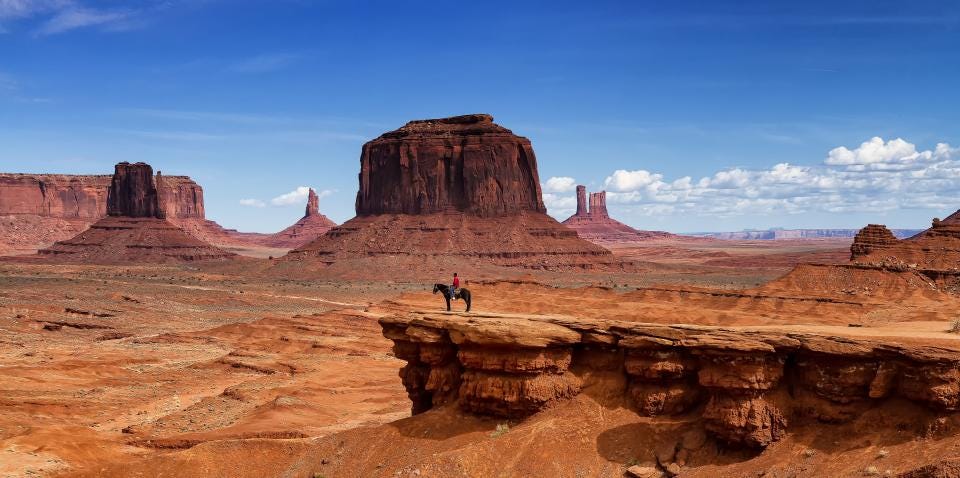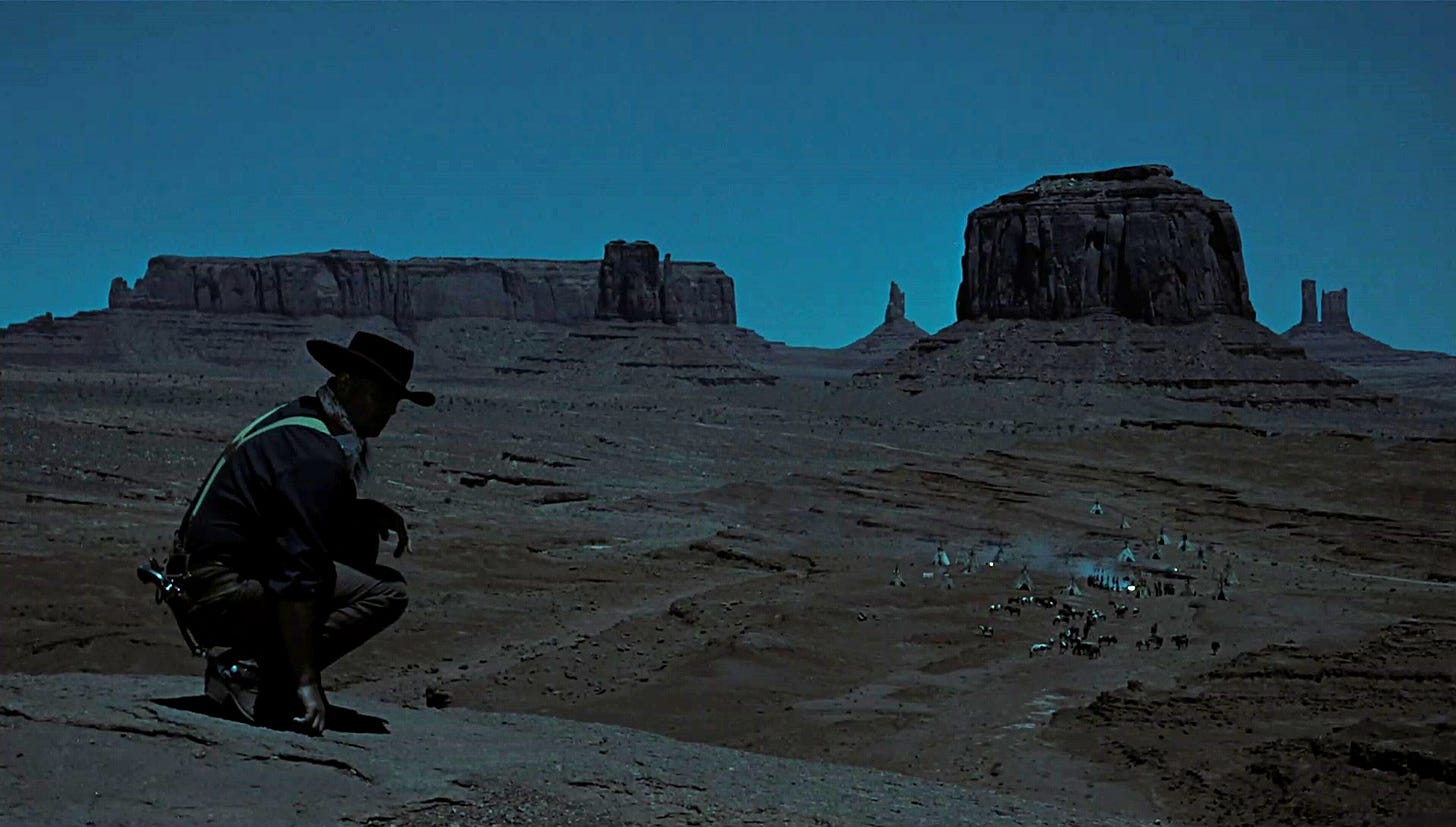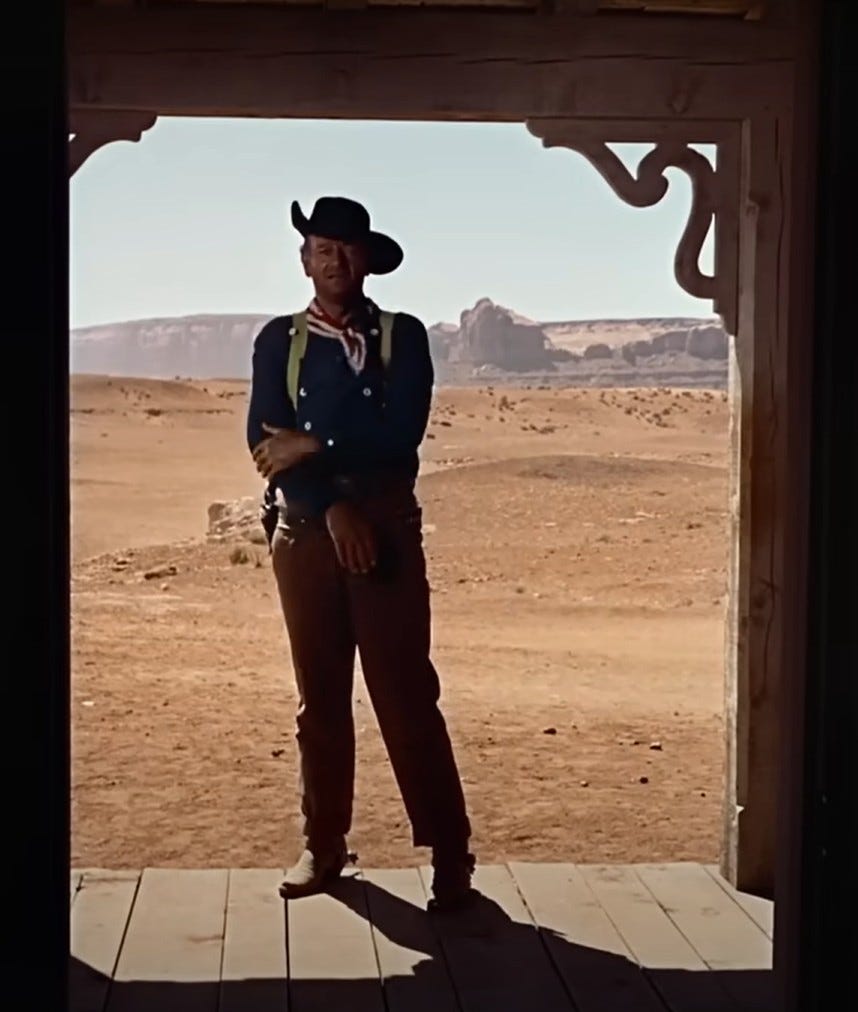It just so happens we be Texicans. Texican is nothin' but a human man way out on a limb, this year and next. Maybe for a hundred more. But I don't think it'll be forever. Some day, this country's gonna be a fine good place to be. Maybe it needs our bones in the ground before that time can come. — Mrs. Jorgensen, The Searchers
Watched John Ford's "The Searchers." A troubled masterpiece. In 1868, Civil War veteran and outlaw Ethan (John Wayne) returns to his brother's Llano Estacado homestead. (My West Texas homeland apparently looks like Monument Valley.) His family's uneasy around him. Ethan and his sister-in-law, Martha, are secretly in love. Martha's youngest daughter, Debbie, might be his.
After he returns, a Comanche raid by "Chief Scar" kills most of his family. Ethan and his adopted nephew Martin spend years hunting for Debbie. But this isn't really a rescue mission. Ethan's a violent racist, and makes it clear that he'll kill Debbie: "Livin' with Comanches ain't being alive." Which would come as a surprise to the Nʉmʉnʉʉ.
"The Searchers" is visually perfect. Every shot's a painting of inescapable beauty. Near the end, a man lifts a woman in the air. The camera pans up. The actors are haloed in smoky light. The phrase "the presentation of the host" rose up in my mind. I was breathless, as if something beautiful had hit me in the chest.
There’s also a personal element here, and not just because it takes place on the South Plains. This film is not just about the West, it is also about people who settled in the West, in Texas—my ancestors. My family could have been the Jorgensens, or any of the other folks in the background of this movie. “The Searchers” drew me in with its beauty, unsettled with its contradictions, and made me complicit in its story. At times, it is a strangely domestic movie, as if to draw attention to how distant Ethan is from the society he ostensibly protects—and how extreme his views must be, even in an era when such opinions were normalized
Indeed, the regal natural unity of the West pushes against the violent obsession of its protagonist: Ethan and his hatred are repulsive. He's Travis Bickle, and he knows it. "The Searchers" tries in its limited way to be enlightened. But it can't escape its racist era, including having the antagonist be a Caucasian in redface.
Despite this, it's a film of staggering craft and profound inner turmoil. Psychological repression is a human universal: you know something, and you wish you didn't know it. That's "The Searchers." Ford was a aesthetic craftsman who hated himself for being a poet. He suppressed his inner self through acting like a tough guy. Only he could've made this movie.
This film holds depths it refuses to delve: fear of contamination, fear of the other--and fear of self. Ethan hates himself. His bio can be inferred: an idealist goes to war for the wrong cause, watches himself kill, loses.
Ethan is a dangerous outsider, and projects onto his enemies everything he loathes about himself--much as Ford agonized about his own sensitive side breaking through. Consider the scene where Ethan looks at a settler woman speaking Comanche. The tortured shadow on his face is some level of internal suffering that there are no words for. Ethan imagines the Other, only to see his own reflection staring back. Is the thing I hate the same as me?
"The Searchers" asks questions it cannot bear to answer. That is its weakness, its tension, and its greatness. The famous closing shot, of a man who cannot take the final step, is fitting. Ethan stares at us through the door like a big wounded animal. I dislike John Wayne and his works, just as sure as the turning of the earth. But as I watch the lonely killer in that doorway, I think: You poor, broken man.








Beautifully put!